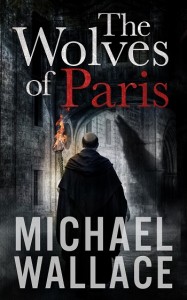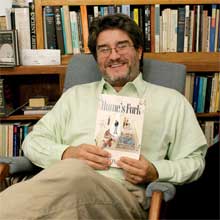PREVIEW OF OUR FEBRUARY 1 GUEST BLOGGER, MARTHA JOHNSON
2/1/14 – PREVIEW OF OUR FEBRUARY 1 GUEST BLOGGER, MARTHA JOHNSON
Executive-turned-writer Martha Johnson explains why she can’t separate her fiction and non-fiction writing personas.
2/1/14 – PREVIEW OF OUR FEBRUARY 1 GUEST BLOGGER, MARTHA JOHNSON
Executive-turned-writer Martha Johnson explains why she can’t separate her fiction and non-fiction writing personas.
 1/26/2014 – THE WOLVES OF PARIS, A REVIEW
1/26/2014 – THE WOLVES OF PARIS, A REVIEW
Stories about vampires and werewolves have been around for centuries but Michael Wallace manages to bring a fresh take to the old tale. Far afield from his stories about Later Day Saints enclaves in scrubby patches of desert, in The Wolves of Paris, Wallace takes us back centuries to 1450 to weave a tale of sorcery and deceit.
1/23/14 POINT OF VIEW: WHO TELLS THE STORY?
“There must have been some movement, a gesture, because every person in the living room would later remember a kiss.” (Ann Patchett, Bel Canto)
Sally Whitney’s lament [LLNB 1/10/14] that most contemporary stories are written from the limited viewpoint of one or a few characters, hit me in all my writerly places. Powerful stories can grab
1/17/14 — THE ACCIDENTAL AUTHOR
Erika Rybeck lives at Riderwood Retirement Community in Silver Spring, Maryland. She intended to put together an album of her life for herself, family and friends. She wrote a narrative to accompany the many photos she had acquired from her childhood and school years.
1/13/14 – WROTE THE BOOK, HATED THE MOVIE (Part 2)
“If there’s one thing I hate, it’s the movies. Don’t even mention them to me.” (The Catcher in the Rye, J.D. Salinger)
Last month I wrote about the daggers that rip through an author’s heart when the “wrong” actor gets cast in the movie version of his/her book. But as much as it hurts to see a beloved character misrepresented, it’s even worse when changes to carefully crafted tone and plot spawn a film that an author feels buries (or even loses) the original intent of the book. Listed below are a few authors who would rather you read their book than watch its movie adaptation.
1/10/14 –WHO KNOWS WHAT? THE PERKS OF A NARRATOR WHO SEES ALL
Story narrators who know everything are out of fashion. Readers today want to be close to characters. They want to experience events of the story the same way the characters do—the way any of us experiences the world—knowing only what we have seen, heard, or been told. Approaching a story like this has spawned a lot of novels written from one or maybe a few characters’ points of view, but it seems to me that as readers, we’re missing something by not seeing the larger picture. And as writers, first-person and third-person limited viewpoints restrict the richness of the worlds we create.
12/17/13 — A TEAM EFFORT TOUGHER THAN FOOTBALL
After giving a talk recently about self-publishing, I received a series of plaintive emails from one of the participants who wanted to know why her book had been on Amazon.com for a year without one sale. I asked her if she belonged to the Maryland Writers’ Association, MidAtlantic Book Publishers Association or any association that might provide the help she needed. “No,” she said, “they all want money for dues.”
Well, yes, but for a fledgling writer, the money is nominal and well spent.
12-13-13 – WROTE THE BOOK, HATED THE MOVIE
“I cried when I saw it. I said, ‘Oh, God, what have they done?'”
“…I was deeply disappointed.”
It was “crummy.”
Ouch. This isn’t what movie directors want to hear after a screening. Worse, these comments came not from random viewers, but from the authors of the books on which each film was based. (Which author said which is noted at the end of this post.)
Although authors dream of seeing their stories come alive on the big screen, it’s also a scary proposition.
12/7/13 — THE LETTERS OF EDITH WHARTON
When I was having trouble with the first chapter of a novel I was writing, a good friend and writing mentor suggested I take another look at Edith Wharton’s The House of Mirth. Its first chapter is a classic; it not only draws you into the story but it also lays the groundwork and foreshadows everything that is to follow.
In fact, the opening was so good I couldn’t stop and quickly reread Wharton’s wonderful classic. But as I put it back on my shelf, my eye caught the volume next to it: The Letters of Edith Wharton, edited by her Pulitzer prize-winning biographer R.W.B. Lewis and his wife, Nancy Lewis. And what a marvelous treasure that turned out to be.
12/4/13 – SLOGGING THROUGH THE CLASSICS
I spent high school immersed in Victorian novels. My purse contained four typed 9×11 sheets listing classic works that every “college-bound” student should read, and every year I dutifully read and crossed more of them off. I defended these books vociferously for their timeless ideas, eschewing more contemporary writing, most of which, I was sure, had only ephemeral value. Though I was writing fiction of my own even back then – and certainly wanted people to read it – my goal was to write something timeless, and I thought my greatest guide to doing so would come from reading other timeless works.
During this holiday, when we should reflect on what we are most thankful for, I am thankful for the Marines.
Of course, I’m thankful for all the men and women who currently serve, thankful for my fellow veterans and retirees who have served in every branch, but it’s the Marines with which I have a special reason for thanks.
My gratitude began with a question posed by my literary agent when she asked me if I would be interested in co-authoring a memoir. I paused for several seconds then answered honestly. “I’ve never written memoir before.”
“Would you like to try?”
My simple yes was followed by a project that changed my life.
Shoshana Johnson had survived a deadly ambush, had been shot through both of her ankles and taken prisoner by a mob of Iraqis in the early days of the war.
11/20/13 AN INTERVIEW WITH AUTHOR RON COOPER. (SEE ALSO HIS GUEST BLOGGER POST ON NOVEMBER 1, BELOW, AND MY REVIEW OF HIS ACCLAIMED NOVEL PURPLE JESUS ON OCTOBER 20.)
 Q: Your novels, Hume’s Fork and Purple Jesus, take us into the lives of the rural underprivileged. In The World Republic of Letters, Pascale Casanova says: “…the birth of the American novel may be said to coincide with the use of the oral language in Mark Twain’s Huckleberry Finn… insisting upon a specific idiom freed from the constraints of the written language…” Purple Jesus is in the tradition Twain started, its characters far free of constraints, language-wise. What are you writing now, who’s at the focus, where’s it set? Will idiom be as much a part of the characters, or are you venturing otherwise?
Q: Your novels, Hume’s Fork and Purple Jesus, take us into the lives of the rural underprivileged. In The World Republic of Letters, Pascale Casanova says: “…the birth of the American novel may be said to coincide with the use of the oral language in Mark Twain’s Huckleberry Finn… insisting upon a specific idiom freed from the constraints of the written language…” Purple Jesus is in the tradition Twain started, its characters far free of constraints, language-wise. What are you writing now, who’s at the focus, where’s it set? Will idiom be as much a part of the characters, or are you venturing otherwise?
11/13/13 – THE PUBLIC NATURE OF PRIVATE JOURNALS
I write journals. Year after year, the stacks of filled notebooks on my closet shelf grow taller, leaning into each other until I’m forced to start another pile. This stash doesn’t even include my high school journals, which I burned before leaving for college. (No regrets. A person can only stand so much embarrassment.)
My journals are a safe place to vent, float ideas, work through issues. They allow me to write honestly about my experiences. But what happens to these volumes when I’m gone? Do I really want anyone reading them when I’m not available to explain myself? At least I’m relatively anonymous; nobody outside my immediate family will care about the words I leave behind, so there’s not much worry about a public airing of my private thoughts.
My first encounter with an unreliable narrator—that I recognized, that is—was years ago when I first read Agatha Christie’s notorious The Murder of Roger Ackroyd, first published in 1926. The ending stunned me as it has many other readers through the years. It also gave rise to a list of rules for writing mysteries formulated by mystery author John Dickson Carr, rebuttals to that list from other authors, and an essay by the well-known literary critic Edmund Wilson entitled “Who Cares Who Killed Roger Ackroyd?”
10/13/13 – THORNE SMITH AND THE AMERICAN GHOST
With Halloween creeping upon us, this seems the perfect time to ask a personal question: how do you like your American ghosts? Do you prefer them spooky? Atmospheric? Maybe you savor a gothic entity laced with fear and darkness, or a tale where the supernatural explores the human psyche. If so, I’ll direct you to Washington Irving, Edgar Allan Poe, or Nathaniel Hawthorne. But if (like me) you prefer the sorts of ghosts who eagerly urge you to hoist a drink or two (or twenty), then you’ll want to spend an evening with Thorne Smith.
10/10/13 – WHAT MAKES FICTION TRULY SCARY?
’Tis the season for “goulies and ghosties and long-leggedy beasties and things that go bump in the night.” And from all such creatures, the Cornish Litany implores, “Good Lord, deliver us!”
We may indeed need to be delivered from ghosts, vampires, aliens from other planets, monsters, zombies, and other strange beings. Such fiends have long been the staple of horror stories, tales told ’round a campfire, and movies that send people screaming from the theater. But I believe the scariest stories hit much closer to home. Although I never read books classified as “horror,” I’ve been plenty scared by some of the novels and stories I do read.
10/7/13 — THE ENDURING APPEAL OF LEE CHILD’S JACK REACHER
It takes a special kind of a protagonist to carry a long series of books.
Our heroes have to be characters we can root for and identify with. We don’t expect to ever do what they can do, but we have to share their values and dreams and appreciate their finer qualities. (Think Robert Parker’s Spenser, whose sense of right and wrong comes along with his devotion to the woman he loves, a friend who’d die for him, and gourmet cooking skills).
They have to be unique, with special talents and characteristics that make them stand out in a crowd, as well as a weakness or two to make them human.
After reading and frankly, becoming obsessed with the four-book series of The Remaining, I had to talk to the author and find out more about…well, everything. I reviewed the series a few weeks ago, but couldn’t resist the urge to toss a few questions at D. J. Molles.
First, if you’ve not heard about The Remaining, I strongly believe that soon, you will. It’s a captivating look at a post-apocalyptic world, with a strong military protagonist and a realistic look at what could happen to survivors as they attempt to eke out a life amongst all hell breaking loose, government collapse and fight-to-the-death power plays.
9/13/13 – SUSPENDING SUSPENSION OF DISBELIEF
In 1817, Samuel Taylor Coleridge coined the expression “willing suspension of disbelief.” Suspension of disbelief is a wonderful thing. It allows us to enjoy and accept premises in our reading that we might never believe otherwise. As originally conceived, it was the author’s job to inject enough impression of truth into an unrealistic tale that a reader could suspend judgment of the improbability of the story. But over time the responsibility has shifted from how well an author creates a fictional world to how willing a reader is to lose herself in it. In short, the onus falls on readers to believe.
9/4/13 – DISCUSSABILITY: THE KEY TO A GOOD BOOK CLUB BOOK
Book clubs are often maligned as places where people do just about everything except discuss books. But when I asked members of my own book club for reading recommendations, they confirmed what I had always suspected: book clubs not only discuss books, but “discussability” trumps literary merit.
9/1/13 – VISITS TO TARA
Millions of books were published last year. (Yes, really!) There’s a literary smorgasbord out there filled with more tasty stories than anyone could possibly devour in a single lifetime. Why, then, do we still make time to reread certain titles?